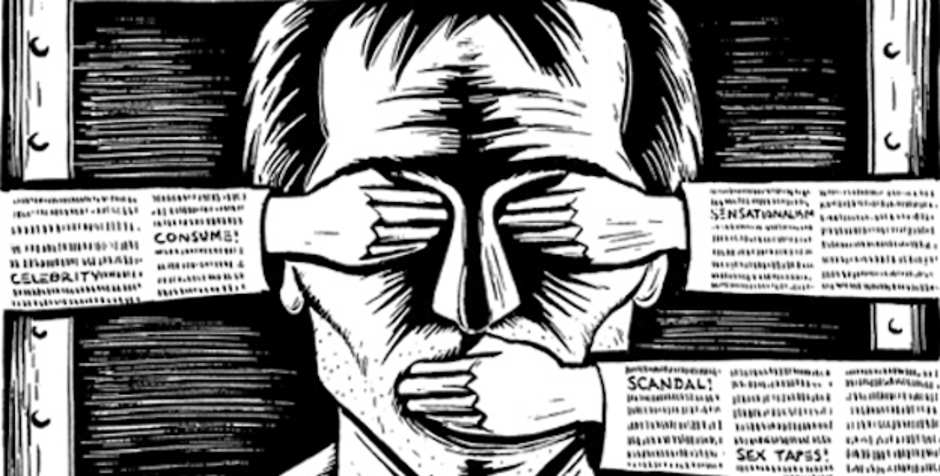The search for truth, through discussion based on reason, is a foundational element of our civilization. This foundational element is the basis for the freedom to rationally criticize Islam, just as there is freedom to criticize any other belief or ideology – religious or secular.
Despite this fact, it is becoming increasingly difficult and dangerous to criticize Islam publicly, even as it is on the rise in Europe. Authors of such a criticism, even those with solid arguments, immediately expose themselves to accusations of “intolerance”, “Islamophobia”, and even to legal proceedings. This emotional backlash that seeks to destroy all who dare voice any opposition is the reason freedom of expression is dying, and with it, the ability of society to subject Islam to a rational and critical examination.
Nowadays, the freedom of expression is no longer a firmly guaranteed human right. At the UN, the freedom of expression is under attack by members of the Organisation of Islamic Cooperation (OIC), who are trying to create an international ban on “defamation of religions”.
As for the ECHR, it hesitates to protect freedom of expression in religious matters – when it comes to criticism of Islam. In 2018, the ECHR confirmed the conviction of an Austrian speaker who described Muhammad as a “pedophile” because of Muhammad’s marriage to Aïcha (a 6 year-old girl). But then, in 2019, it did not censor that of two Azeri journalists who also criticized Islamic culture.
In the Azeri case (Tagiyev and Huseynov v. Azerbaijan), the ECHR finally defended the freedom of expression of journalists after one of them, targeted by a fatwa, was assassinated. The journalists dared to compare Azerbaijan, Islam, and Europe in an article entitled “Europe and us”. They inferred from this comparison, among other things, the superiority of Western culture, the “stupidity” and “folly” of Muslim philosophers, and called the founder of Islam a “frightening creature” in comparison to Jesus Christ.
Conversely, in the Austrian case (E.S. v. Austria), the lecturer, speaking in front of about 30 people, denounced the practice of child marriages, particularly the marriage of young girls, that exists in certain Muslim countries which are following Muhammad’s example. Charges were brought against the lecturer and she was found guilty of “disparaging religious doctrines.” The European Court confirmed her conviction because, according to the ECHR, her words sought not to inform but rather to demonstrate that Muhammad “was not a worthy subject of worship” and constituted “a malicious violation of the spirit of tolerance, which was one of the bases of a democratic society”. The Court found her words “likely to arouse justified indignation in Muslims” and that these words were “putting religious peace at risk”.
According to this reasoning, merely speaking words of criticism – not words of incitement to violence – but words that factually critique a historical figure must be censored because Muslims who revere that historical figure would respond with actual physical violence. Thus, it is not a lecturer who speaks truth who is protected, but violent Muslims who would not hesitate to physically harm someone for speaking the truth. But this reasoning is even further flawed, because it applies only to the criticism of Islam. Were an Islamic speaker to criticize Christianity, there would be no public outcry or threats of violence that were protected over the right of the Islamic speaker to say what he believes. Furthermore, the European Court is not applying its created “tolerance test” uniformly across the board, as clearly Muslims would then have to also tolerate the lecturer’s opinion in this case, which was obviously not the outcome. Only the speaker was deemed in violation of “tolerance.”
And now there is yet another such case soon to be judged by the ECHR. Eric Zemmour seized the ECHR in late 2019 after being convicted of “incitement to religious hatred”. What for? He stated that Muslims must be given “the choice between Islam and France”, that France has been living “for thirty years an invasion”, and that “in countless French suburbs where many young girls are veiled ” there is a “ struggle to Islamize a territory ”,“ a jihad ”.
The ECLJ has been advocating for years, both at the UN and at the ECHR, in support of freedom of expression and religious freedom, and will continue to do so, with your support. For the ECLJ, the freedoms of religion and expression are complementary, and there is no right, for believers and non-believers, not to be subjected to sound criticism. Only gratuitously offensive insults, slanders and obscenities as well as words immediately inciting violence can be restricted. Any other statement should be freely expressed.
Support freedom of expression, sign the petition!
Food for thoughts:
- Criticism of Islam: the ECHR (Finally) Upholds Freedom of Expression, read the press release.
- S. v. Austria, ECLJ’s Written Observations, read the Observations.







